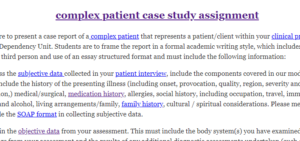complex patient case study assignment
complex patient case study assignment
You are to present a case report of a complex patient that represents a patient/client within your clinical practice ( High Dependency Unit. Students are to frame the report in a formal academic writing style, which includes writing in the third person and use of an essay structured format and must include the following information:
Discuss the subjective data collected in your patient interview, include the components covered in our modules; this may include the history of the presenting illness (including onset, provocation, quality, region, severity and duration,) medical/surgical, medication history, allergies, social history, including occupation, travel, immunisation, drug and alcohol, living arrangements/family, family history, cultural / spiritual considerations. Please mention and include the SOAP format in collecting subjective data.
Explain the objective data from your assessment. This must include the body system(s) you have examined, the findings from your assessment and the results of any additional diagnostic assessments undertaken (such as vital observations, ECG, spirometry, pathology or imaging for example).
Using contemporary literature and relevant guidelines, provide rationales for your clinical impressions (potential diagnosis/diagnoses) for your patient assessment.
Create a management plan; including recommendations for evaluation and reassessment of your patient. This must include relevant evidence to justify your decision making. Your case report must also provide an analysis on any adaptations to the assessment and treatment plan that would support and promote Indigenous Australians health beliefs.

complex patient case study assignment
Patient Health History
The following case study took place whilst I was employed as a Registered Nurse on the High Dependency Unit at Fiona Stanley Hospital. I was undertaking the role of the shift co-ordinator when a patient was admitted to the ward. To maintain patient confidentiality during this case study a false name John Gray will be used
Identification: Patient John Gray, 50-year, male, unemployed.
Patient details: John Gray is a 50-year-old unemployed male.
Situation: Paramedics attended residence of Mr Gray as called to attend to his spouse Mrs Gray. However, upon arrival paramedics found Mr Gray to be slumped in his chair with a decreased level of consciousness.
History of Present Illness: As per correspondence from Mr Gray’s family they state patient had “been acting like a zombie for a few weeks”. However, relatives were unable to provide accurate details regarding the onset of reduced cognition/increased drowsiness.
Past Medical and Surgical History: Polysubstance use, Bipolar affective disorder, Chronic pain, Hepatitis C, Skin and Joint abscesses secondary to IVDU, Chronic Renal Disease, Anaemia, ADHD, Cluster B personality disorder, PTSD (hx? childhood sexual abuse)? OSA, T2DM, Anxiety & depression
Medications hx: Methylphenidate MR 54mg OD, Olanzapine 15mg nocte, Lorazepam 5mg at midday, Desvenlafaxine 200mg od- ceased 2weeks ago, not clear who ceased, Hydromorphone 48mg
Allergies: Gabapentin (causing seizures), Pregabalin (nausea and vomiting).
Family history: Unable to attain accurate family history from patient due to decreased consciousness. The parents of the patient were exhibiting features of cognitive impairment and unfortunately patients partner unaware of any family history. Hence no accurate history obtained.
Social history: Patient living with partner/ carer (partner is 75yrs old and has multiple comorbidities). Mr Gray is unemployed with only form of income being the disability support payment. Patient has carers who attend his residence daily providing assistance with: meals/ shopping, and cleaning. Mr Gray is a current IVDU and despite being on a mental health plan for his variety of mental illnesses he is non-complaint. Patient also has poor oral intake and recent unintended weight loss. Paramedics expressed concerns for patience current living arrangement. Stating that carer of patient was elderly herself (75yrs) with multiple co-morbidities. Carer also stated she wasn’t concerned about patients decreased consciousness.
A-E assessment of Mr Smith:
Airway: Patent/ clear airway.
Breathing: Respirate rate 18 breaths/minute, equal rise/fall of chest, auscultation chest is clear. No use of accessory muscles, Trachea is midline Oxygen Sats 98% on Room Air.
Circulation: Heart rate 32, irregular and faint rhythm, in sinus Bradycardia, Blood Pressure 90/45 mmHg. Capillary refill less 3-4 seconds, cool to touch, appears pale. Nil addition heart sounds on auscultation. Incontinent of urine, Bladder scan showing 900mls in Bladder.
Disability: AVPU – Alert to pain GCS 9 (E2, V3, M4). Possible overdose to psychotic and opioid medications, with some psychosis. BSL was 4.0mmols.
Exposure: Temperature was 36.0’C, nil signs of trauma, mild bruising on bilateral lower limbs. A few needle marks on left arm cubital fossa appear old.
Investigations and Management:
Short Team Goals: ECG (sinus brady with a few pauses). Aggressive Fluid resus for low BP, Atropine for low HR, IV antibiotics for UTI, Electrolytes replacement Mg and K+ (bloods were k+ 3.3, Mg 0.68). 2 uPRBC transfused. VBGs check every 2 hours. Urine dipstick and Urine MCS. Neuro + Full vital Signs hourly. IDC inserted. Continuous cardiac monitoring. Drug screen tests. AWS + COWS monitoring. CT head, neurology review. Chest x-ray, Drugs and alcohol services
Long Term: Repeat CT head in 24hrs, Daily FBC, + other bloods. Referrals and input as below, ECHO and cardiology review
Blood tests– Full Blood Count (HB 78 baseline 90, WCC 3.33), LFTs (elevated), UECs (creatinine 230 – baseline 120), eGFR 40), CK (2000), CT Head (nil intracranial haemorrhage)
Discharge Plan: Cardiology/ haematology, ICU, Psych/ Alcohol and Drugs review, Renal. Referred to dietetics for decrease oral intake and loose in weight. Liaised with social worker (social issues), pharmacists (medication reconciliation), OT (cognitive assessment). Ongoing management in medical unit, when cleared was transferred to Psych unit. Engagement with family and social outreach team.

